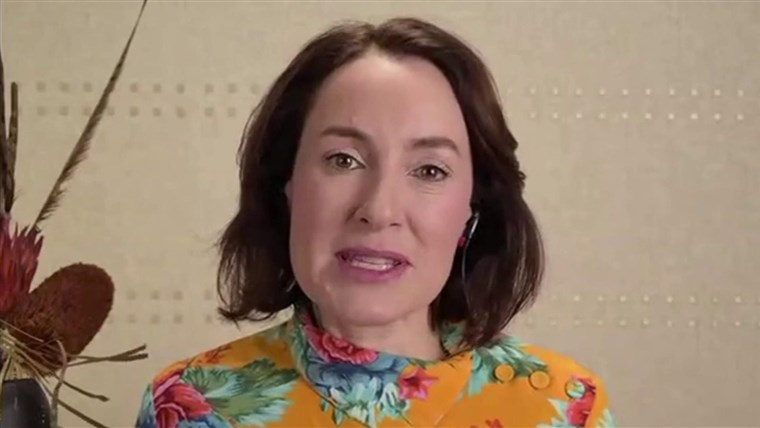
Zuher Ibrahim was looking forward to graduation. As a first-generation college student, walking across a stage in a cap and gown and receiving a diploma felt like the perfect way for her — and her family — to celebrate the milestone. But COVID-19 wrecked those plans.
“It is just added an extra layer of disappointment,” Ibrahim, 21, of New York City, told TODAY. “I had this idea of what graduating would be like and COVID took it away from me. I’m grateful to have graduated and I’m grateful that I finished in one piece, but it’s disheartening.”
Ibrahim ordered her cap and gown and posed for a photo shoot so her family in Ethiopia could still see what graduation might have been like. That helped quell her disappointment a bit. But she has found that grappling with the coronavirus pandemic requires some dedication to her mental health. After waking, she takes a solitary walk for an hour and when she feels especially drained she watches reality TV.
“I take it day by day,” she said.
But Ibrahim didn’t always take time to focus on self-care. When she was a freshman she was often overwhelmed. That is when she founded an Active Minds chapter at Pace University. Active Minds encourages college students to talk about mental health to reduce the stigma and help provide access to resources.
“It took until quarantine for me to realize everything I was saying to everybody else I now needed to do myself,” she said.
While Ibrahim feels like she’s doing the best she can, many young adults, teens and women are struggling.
“What we’ve been witnessing for the last several years, probably the last decade, has been an increase in stress, anxiety, concern … in our youth,” Benjamin F. Miller, the chief strategy officer for Well Being Trust, a national foundation focused on improving mental health around the country that recently released “Advancing Adolescent Flourishing: Moving Policy Upstream,” a report that provides 47 action items for the federal government to address and support the mental health of teens.
Teens have reported experiencing more stress than older people even before the pandemic. Anywhere from 58% to 68% of teens experience discrimination based on race or ethnicity and a whopping 98% of LGBTQ teens have overheard homophobic slurs at school, according to two recent surveys of thousands of teens from the American Psychological Association.
Amy Green, the director of research at The Trevor Project, a non-profit organization focused on suicide prevention efforts among LBGTQ youth, said that her research also shows that teens in the LGBTQ population face more hardship.
“Prior to the pandemic LGBTQ young people were at an increased risk for things like depression and anxiety,” she told TODAY. “A lot of that has to do with experiences of discrimination and rejection and harassment.”
Green noted that many LGBTQ youth have been without much needed support during the pandemic.
“A lot of the resources and support they really have is through supportive adults at school, through classmates, peers, through things like gender-sexuality alliances,” Green said. “They may no longer be in place.”
While Well Being Trust’s focus was not on adults, recently the American College of Obstetricians and Gynecologists announced it recommends screening for anxiety for all girls and women starting at age 13.
“The lifetime prevalence of anxiety in women is 40%, and for a woman with depression that increases to almost 60%. This prevalence rate is roughly similar to what we see for diabetes,” Dr. Jeanne Ann Conry, chair of the women’s preventative services initiative, told TODAY via email. “Anxiety is a serious condition that compromises quality of life. It is also under-diagnosed.”
While the Well Being Trust’s report sounds bleak, Miller believes that working with teenagers to craft policy can lead to positive changes.
“We can create more tailored solutions to the teens within their respective communities,” Miller said. “Teens have to be involved in the decision making. If you’re a Black youth living in the community and you’re not at the table helping to create solutions through policy through your community, it is a lost opportunity.”
Often teens are overlooked when it comes to policy making, but they can make a tremendous impact. When Lori Riddle was in high school, she testified before Oregon’s state legislature to promote a bill to make mental health days approved absences for school students — and it passed. She hopes that having mental health days will help teens feel less stigma.
“I always felt like I had to make an excuse,” the 19-year-old college student, located outside of Portland, told TODAY. “I felt like (my anxiety) was something I had to hide.”
Riddle experienced “bad anxiety attacks” and often needed a day of rest after one.
“I never called into my school and said, ‘My mental health is suffering,’” she said. “I feel really proud of the bill. I’ve had former classmates texting me and saying, ‘I appreciate you. Thank you so much for doing that’ because they feel like now they can take their mental health more seriously.”
Ibrahim is pursuing a master’s degree to work in public policy and hopes her mental health activism plays a role in her future. She’s urging her peers involved in protesting now to remember to take care of themselves.
“Activism and advocacy work are exhausting. It’s OK to put the phone down, and step away,” said Ibrahim. “It’s OK to be selfish with your mental health.”
